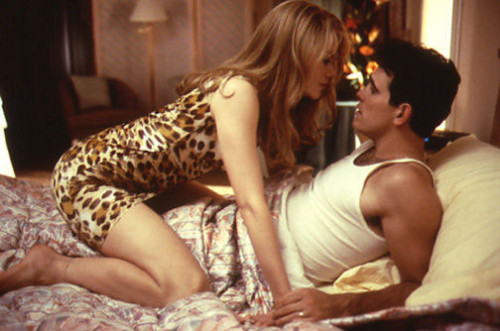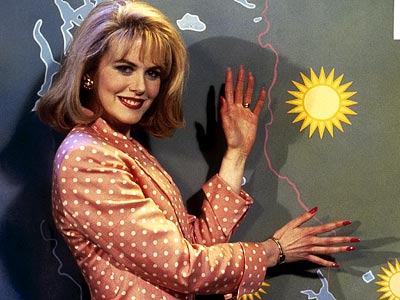
Written by Rachael Johnson as part of our theme week on Unlikable Women.
Spoilers galore.
You’ve got to give it to Nicole Kidman. For an archetype of Hollywood movie stardom, she has–for many years now–been quite unafraid of taking on edgy, unsympathetic roles. Her impressive turn in Gus Van Sant’s mockumentary black comedy, To Die For (1995), could, arguably, be considered Kidman’s first truly risky part. In it, she plays a murderously self-interested, fame-obsessed small-town TV personality with the perfectly fitting name of Suzanne Stone. “You’re not anybody in America unless you’re on TV,” Suzanne sermonizes at the start. “On TV is where we learn about who we really are. Because what’s the point of doing anything worthwhile if nobody’s watching? And if people are watching, it makes you a better person.” The would-be news anchor is not only an extraordinarily unlikable–though entertaining–protagonist; she also embodies certain pathological tendencies in the American cultural psyche.
Surfaces seduce and deceive in Van Sant’s satire on American ambition. Suzanne is a vision of beauty and purity for her future husband, Larry Maretto (Matt Dillon), when he first encounters her, and the crimes she commits take place in an ordinary, pretty town in New Hampshire called Little Hope. It’s love at first sight when the laddish, none-too-bright Larry catches her eye while playing with his band at his father’s restaurant. Janice, Larry’s savvy, ice-skating sister (Illeana Douglas), immediately sees through Suzanne but he ignores the ice-maiden cracks and commits to the “the golden girl of my dreams.” The young man surprises everyone by ditching his drums and rock star ambitions for marriage and home-buying. Janice acerbically observes, “he went from Van Halen to Jimmy Vale overnight.” Larry is not only taken by Suzanne’s beauty; he’s also in awe of her go-getting personality. “She’s going places. She’s got goals,” he tells his father, Joe (Dan Hedaya). Larry, by the by, comes from a fiercely loving, old-fashioned Italian-American family; Suzanne’s parents are portraits of smug, airy WASPness.

Suzanne soon gets a job at the local cable TV station as a weather presenter. Her co-workers baptise her “Gangbusters” and she becomes a workaholic member of their tiny outfit. Fancying herself as a future Barbara Walters, she understands that she must start somewhere. Tensions, however, surface on the first anniversary of her marriage. Larry wants a child and more time together but this doesn’t figure in his wife’s plans. She explains to her puzzled mother-in-law, Angela (Maria Tucci), that a baby would prevent her from covering a revolution–or royal wedding. Feeling trapped by his expectations of her, Suzanne determines to bump Larry off. But she does not do the dirty deed herself. She befriends a trio of daft teenagers, subjects of a documentary she’s working on, to set it up and do her bidding. The ultimate plan, of course, is to pin the murder on them. They comprise vulgar Russell (Casey Affleck), impressionable, insecure Lydia (Alison Folland) and sensitive Jimmy (Joaquin Phoenix), who seems permanently stoned. Both Lydia and Jimmy adore Suzanne. She sexually targets Jimmy, all the while him telling tales of marital abuse, and promises Lydia that she will employ her as her secretary when she becomes famous. The besotted Jimmy soon becomes the designated shooter.
But things don’t go to plan for Suzanne when the three luckless teenagers are arrested. Lydia chooses to cooperate with the police, and wears a tape to record a confession by Suzanne but she is acquitted as the authorities took the entrapment route. When Suzanne publicly suggests Larry’s murder was drug-related–her husband, she says, was a coke addict–his family finally crack, and take matters into their own hands. Suzanne just can’t help herself when she is lured to a remote location by the promise of telling and selling her story. Lydia does not see jail and becomes a kind of celebrity but the boys get life.

There are other targets of Van Sant’s satire in To Die For. Suzanne’s family are characterized as unthinking, self-regarding snobs. Her father Earl (Kurtword Smith) thinks his daughter, a junior college graduate with a degree in electronic journalism, is too good for high school Larry. There is even an unsympathetic side to the loving Italian-American in-laws. Apart from arranging a hit on her at the end (!), it’s clear that they want Suzanne to conform to their traditional ideals of womanhood. Even Larry’s cool sister encourages him to “knock her up.” We only really empathize with the teenagers, particularly Jimmy and Lydia. They backgrounds are troubled, and both come from unprivileged homes, but Suzanne mercilessly exploits them. In fact, she not only violates Jimmy’s youth; she also destroys his future. It’s disquieting subject matter. Scripted by Buck Henry, To Die For is actually based on Joyce Maynard’s 1992 book of the same name, a novel inspired by the similar, real-life 1990 Pamela Smart case. Telling the dark, outlandish tabloid tale in blackly amusing faux-documentary style, however, Van Sant maintains a markedly satirical tone. The uniformly pitch-perfect performances serve his vision. Phoenix, incidentally, is superb as the tragic-comic teenager.
Suzanne Stone is a mediagenic monster in pastels. She’s both a perverse creature and a nightmarishly pure ideological product. Entirely indoctrinated by televisual ideals, she’s a kind of Frankenstein of fame. In a more general sense, she is also a wickedly amusing portrait of American ambition, a workaholic who will do anything to get ahead. Suzanne Stone is, what’s more, a thoroughly unoriginal person. Her ideas are pilfered from others as well as, of course, television. To Die For not only sends up the hollowness of fame; it also attacks the manufactured personality. Suzanne believes that the human mind can be fashioned and cultivated by self-motivation books, and, again, television.

There is also that charming personality. The world revolves around Suzanne and she’s entirely indifferent to the feelings of others. A psychopath really. This is amusingly demonstrated at her husband’s funeral when she stands by his grave and slams on “All By Myself” on a tape-recorder. There’s a socio-economic aspect to all of this too. Suzanne Stone is entitled and knows it. She’s, indeed, an extreme product of white, bourgeois privilege. She warns Lydia when threatened with exposure, “I’m a professional person, for Christ’s sake. I come from a good home. Who do you think a jury would believe?”
An obsession with looks is also integral to her ideological make-up. Some of her comments are quite memorable–such as her suggestion that Gorbachev’s political career would have been more successful if he had had his birthmark removed. To Die For targets television and tabloid culture’s role in stimulating and nourishing human narcissism. The movie takes place, of course, in the pre-internet era–TV’s one of many communication platforms now–but the fundamental message about human vanity endures. As everyone reading this knows, social media has proved to be an extremely indulgent parent of self-love.

To Die For does not solely savage celebrity culture; it also takes aim at culturally constructed American femininity. Suzanne Stone has been entirely radicalised by televisual ideals of cosmetic beauty. Although naturally beautiful, she is paranoid about her own appearance and shamelessly advises the attractive Janice to get plastic surgery. Physical descriptions of Suzanne point to a distinct lack of humanity. Janice calls her an unfeeling doll, Lydia considers her a “goddess” while Jimmy is in awe of how clean she is. Suzanne Stone is not a sensual woman. Her very sexuality, it is suggested, is inauthentic. Sex seems to be primarily an exhibitionist or strategic move bound up with the manipulation of others.
Ultimately, Suzanne Stone is not only a uniquely unlikeable protagonist. Representative of much that is wrong with her place and time- the self-interest, addiction to fame, lookism and classism–she is a skillfully drawn object of satire. Kidman cleverly captures her insane single-mindedness and narcissism. With her purple eyeshadow, short skirts, and little dog Walter–named, of course, after Walter Cronkite–her Suzanne Stone deserves a place in cinematic history’s gallery of dazzling grotesques.
